Knowing how to say hello in Nigerian languages is very important if you ever visit the West African country or mingle with the different ethnic groups. The words ‘hello’ and ‘hi’ are powerful words of greeting and some of the most frequently used words in everyday life. They can help you kick-start a conversation or warm you up to strangers and people you are meeting for the very first time. If you are going to a place for the first time, the best you can do is learn how to say ‘hello’ in the language of the people there. And for a place like Nigeria where there are many ethnic groups, learning this skill is extremely important.
There are many Nigerian languages in existence today. This is because Nigeria itself is a large nation with many different ethnic groups living together within its territory. Nigeria is currently the most populous black nation in the world. It has been also been reported that one in every four Africans and one out of every five persons of African origin is actually a Nigerian. The different ethnic groups in Nigeria all have their own languages that they hold in very high regard.
It is noteworthy that Nigeria is made up of 36 States and a Federal Capital Territory. Interestingly, even though the lingua franca of the country is the English language, there are places where indigenes do not well understand English and so you will have to learn how to say hello or hi in their own language if you want to get their attention.
Greetings Are Very Important In Nigeria
In Nigeria, greetings are an essential part of the culture. They are greatly valued among the different ethnic groups in the country and considered a great sign of respect. As a matter of fact, you cannot just walk up to a person and start talking to them in Nigeria; you have to greet them first before you proceed. If you start asking strangers questions without offering greetings, you will be thought of as rude and the help you seek might elude you. Children are also taught how to greet elders and they can be punished if they forget to do so.
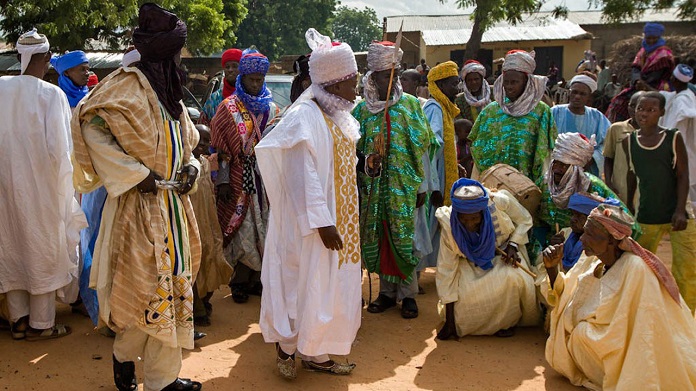
Also, knowing how to say ‘hello’ in a person’s language is a big deal in Nigeria. This is because even if the people you meet actually understand English, they will warm up to you better if you say ‘hello’ in their own language. They immediately begin to see you as their ‘kinsman’ and can offer you more help that way. So, if you’re visiting any place in Nigeria for the first time and need to interact with the people, you must learn how to say ‘hello’ in their language.
Different Ways You Can Say Hello In Nigerian Languages
There are so many languages in Nigeria right now. At the moment, there are over 525 native languages spoken in the country. However, there are major ones that are more spoken every day across the country. Let’s show you how to say ‘hi’ or ‘hello’ in Nigerian languages.
1. Kedu
‘Kedu’ is the word used to say ‘hello’ among the Igbo people in Nigeria. However, it is noteworthy that even though ‘Kedu’ is the Igbo translation of ‘Hello’, it also literally translates as ‘how are you’, and is used to ask a person how they are doing. Kedu is now the most commonly used greeting by the Igbo ethnicity and is one of the first words a person is taught if they want to learn the Igbo language.
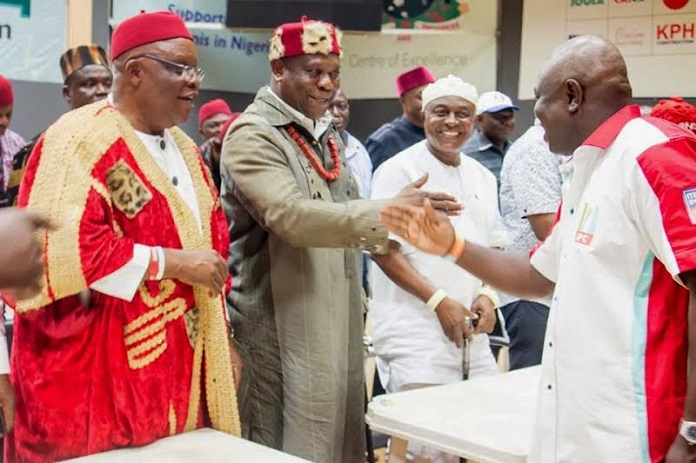
Realize that ‘Kedu’ is an informal greeting and it can be used any time of day. For the record, the Igbos are mainly found in South-eastern Nigeria, as expected, the Igbo language is spoken predominantly in the region. So, if you’re going to that region, it will do you a lot of good to learn how to say ‘kedu’. The Igbo language is also one of the major Nigerian languages at the moment. It is one of the first languages to consider if you want to learn how to say hello in Nigerian languages.
2. Sannu
‘Sannu’ is the formal way to say ‘hello’ among the Hausa people in Nigeria. The term ‘sannu’ is a very common and respectful form of greeting wherever the Hausa language is spoken. For the record, the Hausa people are more concentrated in the North-East, North-west, and North-Central Geo-political zones of Nigeria and so, as expected, these are the regions where the term ‘sannu’ is more widely used by residents. But, take note that the Hausa language is also one of the major Nigerian languages, and speakers are found everywhere in the country.
Among the Hausa people, you can also say ‘hello’ by simply greeting the people by what time of the day it is. Below are ways to say them:
- Ina kwana means ‘good morning’
- Ina yini means ‘good afternoon’
- Barka da yamma means ‘good evening’
Any of these greetings can also be used in place of ‘sannu’ among the Hausa people.
3. Bawo ni
Among the Yoruba people of Nigeria, the term ‘bawo ni’ is used to say ‘hello’. The Yoruba people are more concentrated in the South-Western part of Nigeria and so the term ‘bawo ni’ is more likely to be used in that region. If you have visited any Yoruba-speaking area, you may have heard this phrase used repeatedly. The Yoruba language, along with Igbo and Hausa, forms the three major Nigerian languages, and you’ll find speakers of these three all over the country. These three are your starting point for learning how to say hello in Nigerian languages.
Even though ‘bawo ni’ is the standard greeting used to kick-start a conversation, it is not advisable for a younger person to say it to elderly people as it may be considered disrespectful. Instead, you can say ‘good morning’ or ‘good evening’ to them as the case may be. Below is how to say the greetings.
- E kaaro means ‘good morning’
- E Kaasan means ‘good afternoon’
- E ka a ale means ‘good evening’
4. Mesiere
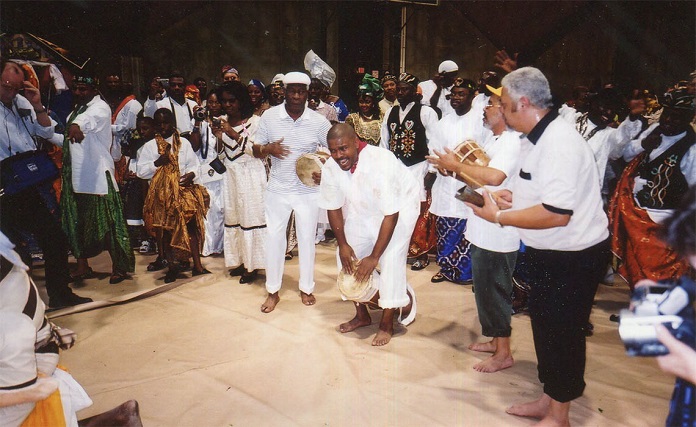
The term Mesiere is a way of greeting used to say ‘hello’ or ‘how are you’ among the Efik/Ibibio people of Nigeria. The Efik are an ethnic group who are concentrated primarily in southern Nigeria, inhabiting the lower Cross River in Cross River state. Efik is one of the popular Nigerian languages.
Today, ‘Mesiere’ is a very common greeting among the Efik/Ibibio people and has become an everyday complimentary greeting that is widely used between people. However, some people have argued that the phrases ‘Idem mfo?’ or ‘Abadie’ are better interpretations or translations of ‘hello’.
5. Kóyo
The term ‘Kóyo’ is a greeting used to say ‘hello’ among the Benin people in the South-South region of Nigeria. It is also used among people around neighboring communities. The term is an informal greeting and can be used at any time of the day as well as in any situation. The term can also translate to ‘how are you’.
So, if you are meeting someone in Benin and you are not quite sure how to greet the person at first glance, just say ‘Kóyo’ and it will be considered appropriate.
6. Ado
‘Ado’ is the term used to say ‘hello’ among the Ijaw people in Nigeria. The Ijaw people are more concentrated in the Niger Delta region of Nigeria. They mainly inhabit Bayelsa State but are also found in Delta, Edo, Ondo, and Rivers states. Among the Ijaw people, ‘Ado’ is a common form of greeting that is used to kick-start conversations.
However, there are some variations to this term; a person can also use the terms ‘Tobaroa’, ‘Nua’ ‘botei’, or ‘Ibasa’.
7. Mavo
‘Mavo’ is a form of greeting used by the Urhobo people in Nigeria. ‘Mavo’ is the way the Urhobos say hello to each other. The term can also mean ‘how are you’ among the Urhobos. Note that the Urhobo people are the major ethnic group in Delta State, South-South region of Nigeria. If you want to master saying hello in Nigerian languages especially in the southern parts of the country, you can’t go wrong with Urhobo.
The term ‘Mavo’ can be used in both formal and informal cases when a person is more relaxed with their acquaintances.
8. Ibaatẹ
Ibaatẹ is the term used by the Kalabari people in Nigeria to say hello. The Kalabari people are a sub-group of the Ijaw people in the Niger Delta region of the country. Among the Kalabari people, Ibaatẹ is a general form of greeting and can be used in informal and formal situations to strike up a conversation.
9. Abole
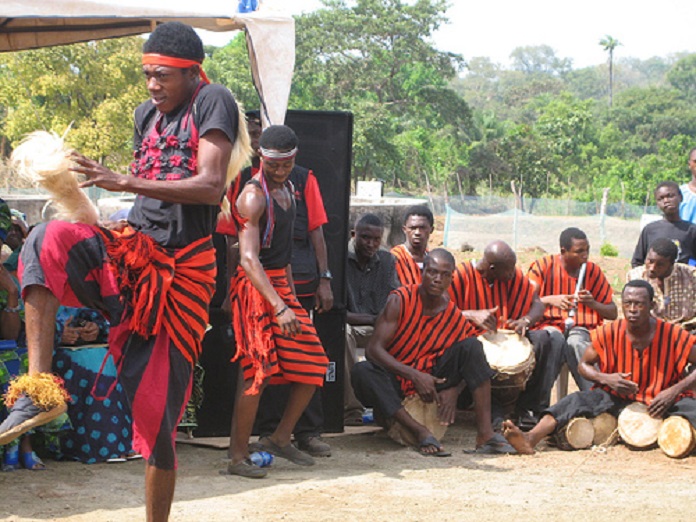
‘Abole’ is used to say ‘hello’ among the Idoma people in Nigeria. However, it also literally translates to ‘how are you’ and is used in informal settings. The Idoma people are more concentrated in Benue State, the North-Central region of Nigeria but they are also found all over the country. The Idoma language is also one of the popular Nigerian languages.
Note that ‘abole’ is not often said to older folks by the younger people. This is because it will be considered quite disrespectful. Instead of saying ‘abole’ to an older person, you can say greeting for the specific time of day. Below is how to say the greetings.
- Nma ochi means ‘good morning’
- Nma eno means ‘good afternoon’
- Nma one means good evening’
10. Shòù
Shòù is the term that translates to ‘hello’ in the Izere language which the Afizere people speak in Nigeria. This ethnic group occupies parts of Plateau and Bauchi States. Among the Afizere people, the term Shòù is used very commonly every day as a casual way of greeting. It can be used in both formal and informal settings. Another word that can be used in place of Shòù is ‘Dàkàzha’.
11. Ushé-ushé
The term Ushé-ushé is used to say ‘hello’ among the Kanuri people in Nigeria. The Kanuri language is spoken in Borno State in northeastern Nigeria where the Kanuri people mainly live. They are also seen in southeastern Niger. Kanuri is one of the popular Nigerian languages now.
Among the Kanuri people, Ushé-ushé is commonly used in their everyday lives as a form of greeting in formal and informal settings. In an informal setting, you can also say ‘Awi yei?’ which means ‘how are you?’ in Kanuri.
12. Ìsoko
Ìsoko is the term used to say ‘hello’ in the Jibu language which is spoken mainly in Katsina State, in the northwestern geopolitical zone of Nigeria. In the Jibu vanguard, ‘Ìsoko’ is the general way to call out a general greeting or hail others if you want to start a conversation.
13. Agba
Agba is the term used to say ‘hello’ in the Igala language. The Igala people are mainly concentrated in Kogi State, North-central Nigeria. The language is also one of the popular Nigerian languages at the moment and should be familiarized if you want to master saying hello in Nigerian languages especially in the north-central part of the nation.
The term ‘Agba’ is widely used to greet people in Igala and is replied with ‘Awa’ or ‘Nago’. These three words ‘Agba’, ‘Awa’ and ‘Nago’ are so widely used by the Igalas that they have become some sort of signature sounds associated with the region.
Among the Igala people, greetings for the time of day can also be used in place of ‘hello’. Below is how to say the greetings:
- Wola odudu means ‘good morning’
- Wolu oroka means ‘good afternoon’
- Wolu odu means ‘good evening’
14. Msugh
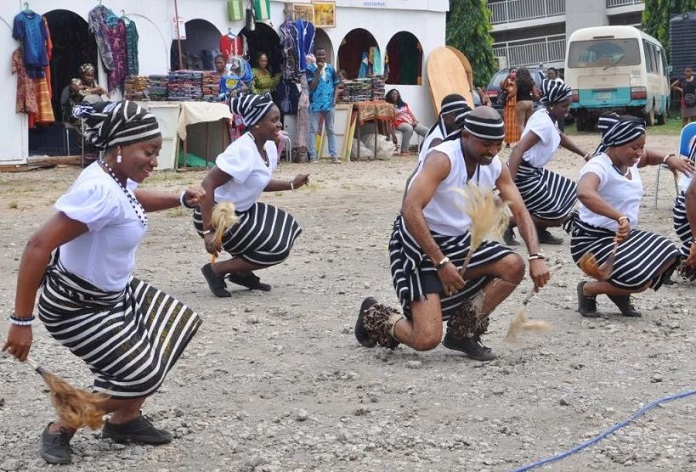
Msugh is the term used to say ‘hello’ or ‘hi’ in the Tiv language. The Tiv people are mainly concentrated in Benue State. However, the Tiv language is also spoken in parts of Plateau, Taraba, Nasarawa, and Cross River States. It is one of the very popular Nigerian languages.
Among the Tiv people, the term ‘Msugh’ is used to say ‘hello’, however, it also translates to things like thank you, sorry, welcome and more. So, if you are at a loss on what to say to a Tiv person, just say Msugh!
15. Wáà súnà
The term Wáà súnà is the greeting used to say ‘hello’ in the Kaningkom-Nindem language. This language is mainly spoken in Kaduna State, northwestern Nigeria. Wáà súnà is widely used to acknowledge a person in greeting or just show some respect to the person.
If you are not sure you want to use Wáà súnà, you could also say ‘Yeni a wo?’, a term that means ‘how are you’.
16. Me digwa
‘Me digwa’ is used in the Isoko language to say ‘hello’. The Isoko language is mainly spoken in Delta State, in the South-South geo-political zone of Nigeria. ‘Me digwa’ is a general form of greeting that passes for ‘hello’. Usually, when a person greets another with the term ‘Me digwa’ the response would be ‘Re do’.
17. Bokór
The Itsekiri people of Nigeria greet each other with the word Bokór which means ‘hello or hi’. The Itsekiri people are mainly found in the Warri South, Warri North, and Warri southwest local government districts of Delta State but can also be found in other parts of the country. Theirs is one of the popular Nigerian languages at the moment and is one of the languages to learn if you want to master saying hello in Nigerian languages in the south of the country.
For the Itsekiri, Bokór is the general way of greeting when you meet someone or want to start a conversation. It can also mean ‘how are you’. In any case, when you say Bokór to an Itsekiri person, you have caught their attention.
